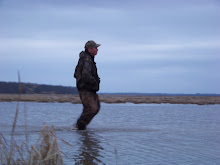"The Show"
To the casual observer and the non-hunter, a turkey is a turkey is a turkey. A dead turkey is nothing more than the opposite of a live turkey and little consideration is given to how it ended up that way. To those unfamiliar with the sport, it doesn’t matter how a longbeard winds up getting hoisted up by the legs; hence, little appreciation is shown by those not anointed when one of us actually harvests a gobbler.
Those who don’t turkey hunt have virtually no appreciation of the tactics and accoutrements of the sport. Such is not the case, however, with deer hunting, fishing, bird hunting and other outdoor endeavors. One does not have to hunt deer to know that, for the most part, deer are shot with rifles from some distance up a tree. And one does not have to fish to know that fish are caught on hooks which are tied to the end of a line that is extended from a pole.
How many times has an aunt or a co-worker or a cashier asked us, “Did you catch any turkeys last time?”
Likewise, how many times has someone you’ve been talking about turkey hunting with expressed surprise at the discovery that turkeys are not shot from hundreds of yards away with long rifles, and that we don’t sit in shooting houses to do it?
“Really? You just sit there on the ground and try to shoot them up close with a shotgun? Aren’t their heads really small and hard to hit? Wow. That sounds hard.”
Yeah. Tell me about it.
But like most things in life, turkey hunting comes in layers. Regrettably, not every turkey hunt which is prosecuted in the spring woods is honorable, or even difficult. Lots of turkeys die just moments after flying out of their trees or after strutting for an hour for a harem of hens as they scratch up a chufa patch. And as much as it pains me to say it – again, regrettably – mine appears to be the extreme minority view.
For not all turkey hunts are created equal. The beginner takes what he can get, even if that means bushwhacking a gobbler he sneaks up on as he rounds a curve in a winding woods road. Some beginners get lucky and call up a nice gobbler that cooperates. After dropping the hammer on the unsuspecting tom, these hunters immediately lose respect for the sport and take it for granted. “How hard can this be?” they think to themselves. “Why are those old-timers always going on about how difficult this is? I must be a natural.”
These fellows are cursed, and most usually don’t hear another gobble or see a turkey track in the dirt for at least ten years.
Some kill jakes. They even go back to work and tell people about it.
Then there are walk-ups which get killed in the afternoon. These unfortunate birds are not relegated to being harvested by beginners; the truth is, a hefty percentage of turkey hunters who have a longbeard just appear within gun range are going to line up their bead on its neck and make it do the upside-down bicycle. I’m not necessarily faulting anyone for doing this. But there isn’t much pageantry to the spectacle.
There are turkeys that die after being intercepted on their way to roost. While blind luck can produce this successful result, it is usually the result of some modicum of scouting and understanding of the bird’s tendencies. This certainly makes it more honorable than ambushing one over a chufa patch at 4:30 in the afternoon, but it’s just a hair above bushwhacking at the same time.
Moving up the scale, calling in one or more hens with gobblers in tow is a respectable tactic, and one which requires an understanding of turkey behavior and how to hunt them. Hen eyes are arguably more acute than gobbler eyes and calling up a handful of hens and still harvesting the gobbler that walks in after they’ve entered gun range is a feat.
No one should ever be faulted for killing a stupid two-year old. These new recruits almost always exhibit an eagerness and determination that make the whole day seem sunnier. They gobble good. They come to the gun good. They prance and strut and do their thing. In fact, the real challenge with a two-year old gobbler is not making the shot, but avoiding getting run over by the bird in the process.
While all of the above are examples of common types of turkey hunts and dead turkeys, none of them typically involves a longbeard putting on “the show.” And regardless whether folks agree that these hunts are lacking in some respects, most will agree that they lack the ultimate prize of any turkey hunt: Watching the gobbler put on the show.
When a longbeard puts on the show, he just acts right. He does it all. He struts. He drums. He blows up like a big, black basketball and does pirouettes in the dirt until breaking out of strut, extending his neck and hammering a gobble that turns your hat around. He may be hung up at 80 yards or he may be well within gun range. He may never close the distance, or you may be so enraptured that you can’t bring yourself to pull the trigger. No matter. You did it. You called up a gobbler and he put on the show for you. When that happens, you’ve had yourself about the greatest day outdoors that can be had.
(c) Roger Guilian 2011


<< Home